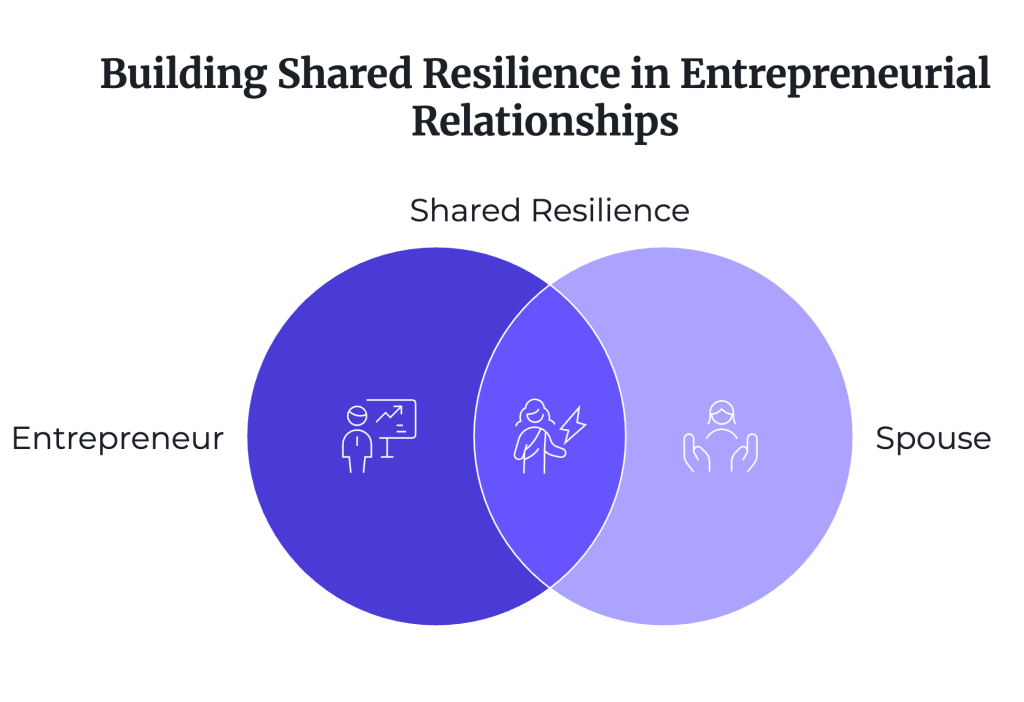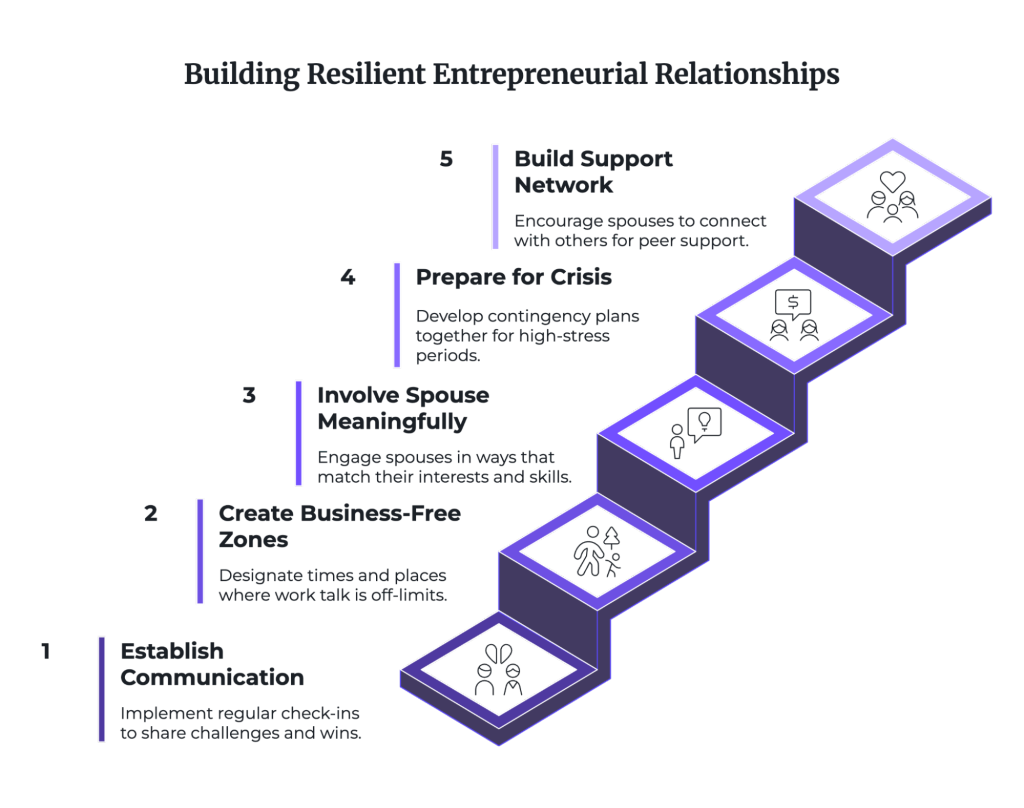The Night Everything Changed
My wife broke down in tears when I finally told her about the failed acquisition. For five days, I’d carried the weight of that collapsed deal alone, pretending everything was fine. We’d even gone to our celebration dinner—the one we’d planned months ago to mark the sale of our startup. She sat across from me that night, eyes bright with hope, believing we were about to cross the finish line. I couldn’t bring myself to shatter that moment.
When I finally found the courage to tell her, watching her face crumble was more painful than the acquisition falling through. That’s when I truly understood the depth of entrepreneur spouse support—the emotional toll it takes on the one quietly carrying the burden beside you. The real cost of my entrepreneurial journey wasn’t measured in failed deals or financial stress—it was in the tears of the person who’d stood by me through it all.
The Hidden Impact on Entrepreneurial Families
Research from American Express found that 84% of entrepreneurs rely on their spouse or partner for emotional support. Yet most of us fail to prepare our partners for the unique challenges they’ll face. Studies show that entrepreneurs are 10% more likely to divorce than their non-entrepreneur counterparts, and up to 87% of entrepreneurial couples experience significant cash flow problems that directly impact their relationship satisfaction.
The entrepreneurial journey creates a perfect storm of challenges for spouses: financial volatility, emotional uncertainty, and the constant blur between work and personal life. Research on work-life spillover demonstrates how entrepreneurial stress first spills into the founder’s personal life, then crosses over into their partner’s world, creating a cascade of anxiety and tension.
What makes this particularly challenging is that traditional relationship advice often doesn’t apply to entrepreneurial marriages. The unique pressures, unpredictable schedules, and extreme emotional swings require a different approach—one that acknowledges both the extraordinary demands and the extraordinary potential of the entrepreneurial path.
Building Mental and Emotional Resilience Together
The concept of shared resilience became clear to me after years of putting my family through unnecessary stress. Just as I learned to build my own mental robustness through the strategies in my book, I discovered that preparing loved ones for startup volatility requires its own framework—one built on transparency, boundaries, and mutual support.
The Harp Family Institute’s research, based on interviews with hundreds of entrepreneurs and their spouses, found that 88% of spouses would marry their entrepreneur again despite the challenges—but only when couples followed specific practices for maintaining connection and communication. This isn’t about luck; it’s about intentional strategies that acknowledge the unique dynamics of entrepreneurial relationships.
The key insight is that spouse support isn’t just about weathering storms together—it’s about building a foundation strong enough to transform those storms into opportunities for growth. This requires treating your relationship as thoughtfully as you treat your business, with clear communication protocols, defined boundaries, and regular check-ins.

When the Startup Almost Cost Me My Marriage
Two years into my startup journey, I’d become unrecognizable to my family. My seventeen-year-old son told me that asking me for anything was “like rolling dice”—I never knew which version of dad would show up. My wife was experiencing the same sleepless nights I was, absorbing my stress like a sponge. I’d turned our home into an extension of my office, where every conversation somehow circled back to funding, product features, or team challenges.
The breaking point came during what should have been a family celebration. My daughter had won a significant academic award, but I spent the entire ceremony on my phone, dealing with a server crisis. When I looked up to see my wife’s disappointed face, I realized I wasn’t just risking my startup—I was risking everything that truly mattered.
That night, we had our most difficult conversation. My wife didn’t ask me to quit; she asked me to include her. “I feel like I’m married to a ghost,” she said. “You’re here, but you’re not really here. And when something goes wrong with the company, I’m the last to know but the first to feel it.”
Her words hit harder than any investor rejection. I’d been so focused on protecting her from the startup’s volatility that I’d excluded her from my life. That conversation became the catalyst for completely restructuring how we approached my entrepreneurial journey together.
Practical Strategies for Creating a Strong Foundation
Based on my experience and extensive research, here are the key strategies for building resilient entrepreneurial relationships:
1. Establish Clear Communication Protocols
Research on entrepreneurial marriages emphasizes the “business report” approach—heartfelt sharing about challenges and wins rather than dry updates. Create regular check-ins:
- Daily 5-minute connects: Share one high and one low from the day
- Weekly deep dives: 30-minute conversations about bigger picture concerns
- Monthly relationship reviews: Assess what’s working and what needs adjustment
2. Create Business-Free Zones
Studies show that couples who establish “business-free hangout zones” report 27% higher relationship satisfaction. Designate specific times and places where work talk is off-limits:
- Sacred morning coffee time
- Date nights with a “no phones” rule
- Weekend activities focused on family connection
3. Involve Your Spouse Meaningfully
Rather than complete separation, research suggests involving spouses in ways that match their interests and skills. This could include:
- Sharing the company vision and major milestones
- Asking for input on decisions that affect the family
- Creating opportunities for them to contribute their unique skills
4. Prepare for Crisis Together
The Kauffman Foundation reports that 71% of entrepreneurs are married, highlighting the importance of crisis preparation. Develop contingency plans together:
- Financial backup strategies
- Emotional support protocols during high-stress periods
- Clear roles and responsibilities during crisis moments
5. Build Your Own Support Network
Encourage your spouse to connect with others who understand the unique challenges. Online communities like “Married to an Entrepreneur” provide vital peer support and validation.

The Transformation You Can Expect
When you implement these strategies, the changes are profound. In my own marriage, we went from near-collapse to becoming true partners in the entrepreneurial journey. My wife no longer feels like a victim of my startup; she feels like a valued advisor and supporter who understands both the challenges and the vision.
Research shows that entrepreneurial couples who follow structured communication practices report:
- 73% improvement in relationship satisfaction
- 65% reduction in startup-related arguments
- 82% increase in feeling supported and understood
- 91% greater confidence in weathering future challenges
But beyond the statistics, the real transformation is in the quality of your connection. Instead of the startup driving you apart, it becomes something that bonds you together—a shared adventure rather than a solo mission.
Your Next Step: Start the Conversation
The first step in creating a strong foundation at home isn’t complicated—it’s having an honest conversation with your spouse about what this entrepreneur spouse support guide means for your relationship. Download our free “Family Startup Preparation Workbook” to guide you through the essential conversations and planning exercises that will transform your home into a source of strength rather than stress.
Remember, your spouse didn’t just marry an entrepreneur—they married a whole person who happens to be building a business. By preparing your loved ones for startup volatility and creating intentional support structures, you’re not just protecting your relationship—you’re building a competitive advantage that will sustain you through every challenge ahead.











Responses